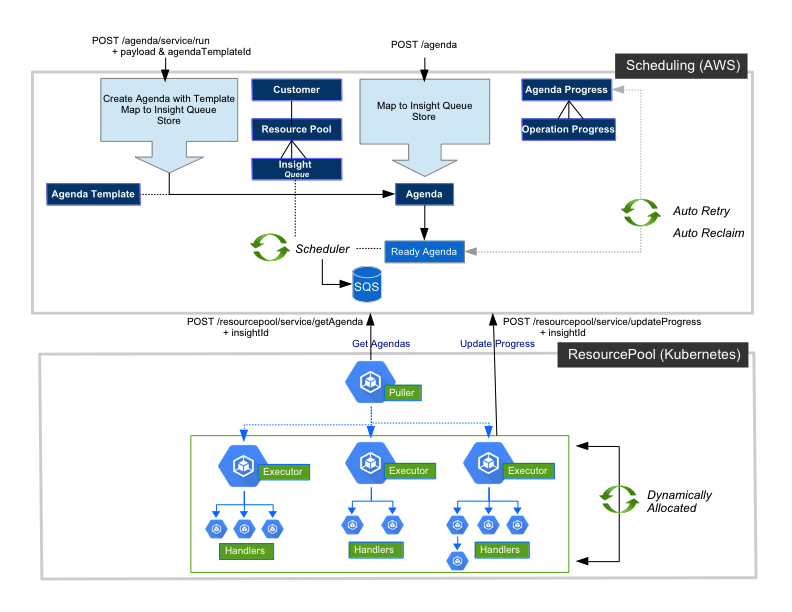-
Notifications
You must be signed in to change notification settings - Fork 0
Home
-
A workflow orchestration system where the workflow is scheduled as a unit giving resource priority once selected
-
Priority queuing and customizable scheduling algorithms
-
Customer aware for multi-tenant
-
Authentication via AWS Authorizer
-
Data object visibility for allowed customers
-
A JSON DAG based blueprint defines the execution flow
-
Executes operations within a workflow by spinning up on-demand Kubernetes Pods (dynamic resource allocation)

-
API Gateway
-
AWS Authorizer
-
Lambda
-
SQS
-
Dynamo
-
CloudFormation
-
CloudWatch
-
Kubernetes
-
Kubernetes Annotations
-
Docker
-
Graphite
Workflow (Agenda) POP's workflow data model is called an Agenda.
-
Simple list of operations
-
Node Graph / DAG model
-
Variable referencing between operations
-
Non-strict API for inputs / outputs of each operation
-
Agenda decoupling from underlying execution technologies / APIs. Each operation has a JSON payload that adheres to the API of the POP Handler that will perform the op.
-
The Agenda Executor will immediately run an operation as long as dependency variables are met
-
The Agenda Executor will look up Docker image by operation type and spin up a new Kubernetes Pod for the operation
-
Supports different scheduling algorithms for work queues (FIFO, Fairness, Priority)
-
Queues are scheduled asynchronously, no more heavy calculations at the time work is requested
-
Queues are defined by Insights (key words / identifiers / key-value pairs)
-
Queue sizes are configurable
-
Dynamic spinning up of Pods with Docker Images
-
No strict schema registration for new POP Handlers
-
No zoning hassles
-
No account permissions per handler
-
Simple Docker image configuration for new Handlers
-
Kubernetes
-
Each POP Handler does one job
-
Handlers are spun up dynamically and control their CPU requirements for dependent Pods
-
Support for centers behind firewalls to have their own Kubernetes cluster do the content processing
-
Namespace segregation for customers wanting isolated resources within the same cluster
- Able to parallel process operations with no waiting dependencies.
- Submission
- Scheduling
-
Execution
the ResourcePool
Agenda
the workflow
Agenda Template
the workflow definition
Customer
Insight
the scheduling queue definition
Operation Progress
the state of the running Agenda operations
Progress
the state of the running Agendas
ResourcePool
the processing resources
Agenda Service
the workflow submission
Progress Service
rolled up agenda progress summary
ResourcePool Service
getting work and updating progress
AgendaReclaimer
restarting stuck Agendas
AgendaRetry
retrying failed Agendas
DataObjectReaper
reaping expired data objects
PodReaper
reaping stuck Kubernetes pods